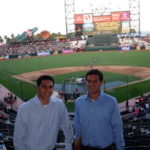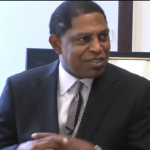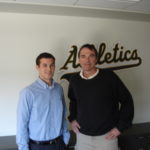We are in the circus ring. Kids juggle and walk the tightrope behind her.
Interview: How To Become a Circus Performer
People thought it was just a phase. I fell in love with the circus right away. My freshman year of college I wrote to about fifty different circuses telling them I’d do anything. Clean up after the elephants, whatever. None of them wrote back. Except one. It was a youth circus run my a Methodist reverend. I happen to be Jewish so I didn’t answer. And he called me. He asked why I didn’t answer his letter. I said, “Well, because I’m Jewish.” And he said, ‘That’s great!’
What this man did, David Harris, was that he got kids from throughout the United States, literally coast to coast, and brought us all together to tour the country doing circus shows. It was Methodist in that it was sponsored by the Methodist church, but the message was, celebrate circus.
That was my introduction to circus.
The shows were amazing. The young people doing them were amazing. Very few of them went pro. Most of them went on to ‘normal’ lives. But of all the shows that I’ve been in since, and I’ve been in some big three ring shows, and the best one ring circus in America, and as good as those shows were, the feeling of those first shows, which was called the Circus Kingdom was more powerful than any other show I was in. There was something about people doing it not because they were trying to make a living, or not because that’s how they were raised, but out of the love of doing it and sharing it with other people.
I went on to become a professional circus performer. A founding member of Big Apple Circus in New York. What’s always meant the most to me is teaching other kids. Being like Peter Pan and sprinkle the magic fairy dust on people. When I came back from that first summer of Circus Kingdom, I asked the Reverend how I could thank him. I said, ‘This is my life’s path. I know it.’ He said, ‘I’ll tell you what my teacher told me. Pass it on.” And I’ve been really blessed to be able to do that.
I did go on to a performing career and went all over America and Canada, but very early on, I also started teaching as well. It was a very simple transition to go to primarily teaching. Eventually this school happened. I’m now second generation with some of these students and they’re going and teaching other people and performing places. This summer we went to Israel and did a collaboration with a Jewish youth service. Eleven of my advanced students here in St. Louis, from all different backgrounds, went to Israel and worked with these Jewish and Arab children. One of the first shows we did was at a home for people with cerebral palsey. I about burst into tears. Because that was totally back to my roots with the Circus Kingdom. And these kids, who didn’t know each other before, were putting together this inspirational show for these people who hardly ever get to leave home and sharing that energy, enthusiasm, and that love for circus. It’s really magical, and it’s why I do it.
That’s why you’ve been doing it for the last 34 years.
There’s something magical about circus anyway. One of the most appealing life forms in the world. It crosses barriers of culture, race, religion, natural origin, finances- almost every culture has had circus. Circus tricks- people doing sumersaults over bulls- they have paintings of that in Egyptian hieroglyphics. Circus has been around for a long time.
It faces and embraces all of humans natural fears. Falling. The dark. Fire. But instead of falling, you’re flying. You jump over fire. You jump through fire. You eat fire. Circus transcends all of that.
Circus deals with people’s fears.
Fear of embarrassment. Clowning is all about your pants falling down! For God’s sake, if that happened to a person in real life it wouldn’t be funny. It happens in the ring, it’s funny. It deals with humans being able to view the impossible.
What’s wonderful about youth circus, the field that I’m in, is that kids are doing the impossible. For kids, people are like, ‘Aww. Look at the kids. They’re such cute little darlings.’ Well, the little darlings are juggling knives. And five balls. And doing double somersaults. That ‘Aww’ turns to real ‘Aww.’ They are capable of doing this.
You mentioned that you found this passion for circus very early on in life.
18.
Did you ever feel like you should go explore…
A real job?
Something like that.
I’ve done real jobs. I’ve always had a ridiculous work ethic. Even when I was in college I had several jobs. I don’t know what my resume would look like if I quit this and tried to go find a ‘normal’ job. I’ve done a lot of waitressing when I was going to circus school. I would waitress by night and go to school by day. But I worked as a secretary and a receptionist.
I noticed that the kids here call you Mom.
The three kids who are my biological children call me that. But yeah, I’m their circus mom. Instead of a soccer mom.
It’s funny. Wife Swap was thinking about using me on their show. They come in the house, and there are only five of us who live in the house, but there are 25 toothbrushes. All with names on them. Because that’s how many of the kids stay over. So they all have their own toothbrushes.
My child was in the ring at 2 weeks old. Because I was in the circus, and that’s the shortest maternity leave they could give me. It happened to be a circus with a storyline, so she was the baby. She did her first trick at six months old. She was balancing and going around a six foot clown. Now she’s a bareback rider and an aerialist.
When you could back to when you were 18, what’d be the one thing you’d tell the 18 year old?
One piece of advice that I’d give myself is practice even more. Because you can’t be too strong or too flexible. But in terms, of looking back, do I have any regrets? If I knew then, what I know now…I think instinctively I did a lot of the right things…I think I would have kept better files. I have piles and piles of things and memorabilia and articles and information and they’re not collated very well. The same with videos.
This is basically my life. A series of questions coming from everyone. It’s like juggling. You just have to keep all the balls up in the air.
How do you keep balanced?
Life is all about juggling your responsibilities and balancing your priorities. You know how you keep balance, and this is true on the wire, is that you don’t stay in one place and balance. You keep taking the next step forward if you really want to regain your balance. I just keep doing what seems to be the next right thing to do.
But is my life in balance? My husband doesn’t think so. He thinks that I work too much. The problem is that when you have people who are working to have the weekends off or evenings off, they’re working because…that’s my definition of, ‘Are you doing the right thing?’ If you won the lottery, would you still be doing what you’re doing. Yes.
The problem with that is there are no clear boundaries. It’s not a problem to me. It’s a problem to people outside who think that there should be clear boundaries. That to me is a good use of time, but my husband feels that it’s a lot of time.
Is there anything else that transcends from the circus to real life?
We actually have a whole book that says ‘Circus teaches the art of life.’ Because it’s true. Almost everything you do in the circus can be used as a metaphor for how you want to live your life. In terms of working together. If you have two people doing a trick and it doesn’t work, you can get on each other, or you can figure out what the problem was and fix it. Which is going to work better?
In a two person pyramid we call the person on the bottom the ‘understander.’ It’s because they stand under, but also, they have to be understanding to support someone else. The top mounter. You have to totally trust who you’re working with. Circus teaches a lot about trust. You have to be responsible, one hundred percent to the other person. Something hurts, it’s not comfortable, your cell phone is ringing- you have to finish the trick until the person you’re working with is safe.
We have a whole book of character traits we feel are illustrated by circus skills. In truth, you could say the same thing about sports. But to me, circus is a much more appealing, exciting, inspirational way to say it. I’m not big for competitive activities, but it’s not about scoring. It’s about you doing your very best and doing the trick as well and as safely as possible. It’s different from a competitive sport. The whole point is to perform it and share it with the audience.
The advanced kids…they were many hats in the circus…tightrope, juggler…
From the beginners, to the advanced, you have to learn the basics of everything. My son has wanted to be a juggler since the age of 2. But still, you have to learn tumbling. You have to learn balancing. You have to learn clowning in terms of a presentation and performance. And you can learn object manipulation. And then you can learn a specialized skill. But you will do better at your speciality if you also have a base level in all these other skills.
The advanced class spends an hour in each discipline every day. Those kids that you saw, each of them have their own speciality. But they all do trapeze, even though only one of them is an aerialist.
What’s the key to learning something that you’re the worst at?
What’s interesting really is that many of the students often choose something that they don’t have a natural infinity for. That’s a challenge to them. Although it varies from kid to kid. The circus is about controlling yourself physically, mentally, and emotionally. If you do something that’s not easy, how are you going to deal with the frustration? If you do something like aerial, but you’re scared of heights, if you can conquer that, if you can control your fear and master the most simple tricks, that’s going to help you somewhere else in your life.
Just the process of learning these skills, either by yourself or someone else, is going to help you across the board in everything you do. The persistence that you need. The focus that you need. A lot of the kids growing up today are surrounded by such short sound bites. Video games. TV Shows. If you can’t concentrate for an ‘x’ amount of time, you’re not going to be able to cross the wire. Sometimes I think the biggest thing we teach is focus. To really be able to concentrate on one thing for such a long period of time.
Also interaction. How many kids do you see standing next to each texting each other? Just talk to the person! You have to communicate verbally and physically with someone else. In some ways we’re a society that’s scared to touch people. In circus you have to touch people.
In coming here, I didn’t know what to expect. But I’m walking away that life lessons can be learned from the circus.
If this hadn’t opened up, I was probably going to be head in the direction of being a social worker with troubled kids. Or a writer. I’m still doing that. I’m just doing it through circus.
There’s a Jewish concept called Ti Coo No Lam. When the world started, something happened and it was shattered into a million pieces. It’s our job as people to put the world back together. My theory is that everyone who is on the right path and doing the right thing is trying to repair the world. But you use your own kind of glue. You can repair the world through medicine, through music, through circus. I happened to find circus to be a very good form of glue that I can use. So that’s what I do.






